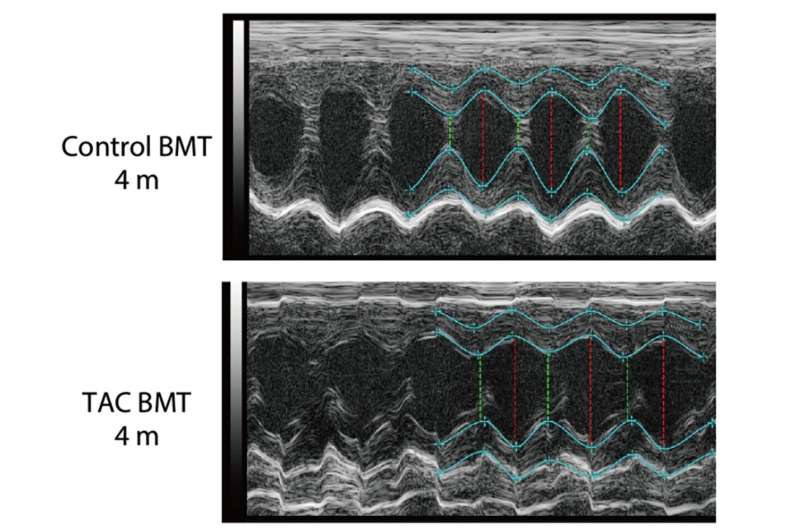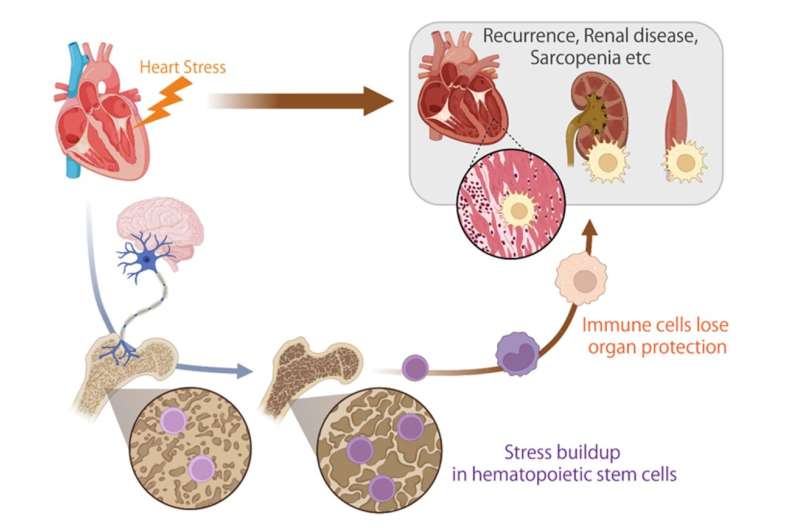This article has been reviewed according to Science X's editorial process and policies. Editors have highlighted the following attributes while ensuring the content's credibility:
fact-checked
peer-reviewed publication
trusted source
proofread
Understanding a broken heart—study finds link between stress and recurrent heart failure

The stress of heart failure is remembered by the body and appears to lead to recurrent failure, along with other related health issues, according to new research. Researchers have found that heart failure leaves a "stress memory" in the form of changes to the DNA modification of hematopoietic stem cells, which are involved in the production of blood and immune cells called macrophages.
These immune cells play an important role in protecting heart health. However, a key signaling pathway (a chain of molecules which relays signals inside a cell), called transforming growth factor beta (TGF-β), in the hematopoietic stem cells was suppressed during heart failure, negatively affecting macrophage production.
Improving TGF-β levels could be a new avenue for treating recurrent heart failure, while detecting accumulating stress memory could provide an early warning system before it occurs.
Healthier lives and improved well-being are among the United Nations' global Sustainable Development Goals. Positively, a recent study shows that life expectancy worldwide is projected to increase by about 4.5 years by 2050. Much of this is thanks to public health efforts to prevent disease and improved survival from illnesses, such as cardiovascular disorders. However, heart disease is still the leading cause of death worldwide, with 26 million people estimated to be affected by heart failure.
Once heart failure has occurred, it has a tendency to reoccur along with other health issues, such as kidney and muscle problems. Researchers in Japan wanted to understand what causes this recurrence and the deterioration of other organs, and whether it can be prevented.
The study is published in the journal Science Immunology.
"Based on our earlier research, we hypothesized that recurrence may be caused by stress experienced during heart failure accumulating in the body, particularly in hematopoietic stem cells," explained Project Professor Katsuhito Fujiu from the Graduate School of Medicine at the University of Tokyo. Hematopoietic stem cells are found in bone marrow and are the source of blood cells and a type of immune cell called macrophages, which help to protect heart health.

By studying mice with heart failure, the researchers found evidence of stress imprinting on the epigenome, that is, chemical changes occurred to the mice's DNA. An important signaling pathway, called the transforming growth factor beta, which is involved in regulating many cellular processes, was suppressed in the hematopoietic stem cells of mice with heart failure, leading to the production of dysfunctional immune cells.
This change persisted over an extended period of time, so when the team transplanted bone marrow from mice with heart failure into healthy mice, they found that the stem cells continued to produce dysfunctional immune cells. The latter mice later developed heart failure and became prone to organ damage.
"We termed this phenomenon stress memory because the stress from heart failure is remembered for an extended period and continues to affect the entire body. Although various other types of stress might also imprint this stress memory, we believe that the stress induced by heart failure is particularly significant," said Fujiu.
The good news is that by identifying and understanding these changes to the TGF-β signaling pathway, new avenues are now open for potential future treatments.
"Completely new therapies could be considered to prevent the accumulation of this stress memory during hospitalization for heart failure," said Fujiu. "In animals with heart failure, supplementing additional active TGF-β has been shown to be a potential treatment. Correcting the epigenome of hematopoietic stem cells could also be a way to deplete stress memory."
Now that it has been identified, the team hopes to develop a system that can detect and prevent the accumulation of stress memory in humans, with a long-term goal of being able to not only prevent the recurrence of heart failure, but also catch the condition before it can fully develop.
More information: Yukiteru Nakayama et al, Heart failure promotes multimorbidity through innate immune memory, Science Immunology (2024). DOI: 10.1126/sciimmunol.ade3814. www.science.org/doi/10.1126/sciimmunol.ade3814


















